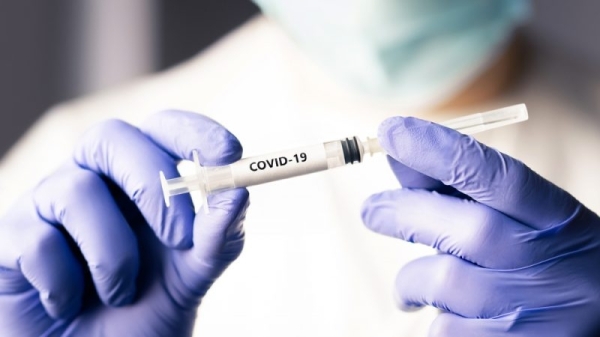COVID committee report faces criticisms on intellectual property

EU lawmakers shared an overall positive view of the final draft report of the European Parliament’s special committee on COVID-19 (COVI) but some of them voiced criticism over the part on intellectual property rights and the social impact of the pandemic.
The final report of the COVI special committee will have no legislative value but aims to draw lessons from the pandemic and establish a series of recommendations to the member states and the European Commission in order to strengthen European health.
“Mistakes were made, but the EU’s role was crucial. We have managed to save millions of lives”, centre-right MEP Dolors Montserrat said before presenting her report to the other members of the special committee on Tuesday (28 February). Other MEPs now have until 28 March to table their amendments to the report.
Intellectual property (IP) rights were one of the points of friction between MEPs from different political groups in the committee. The final version of the report urged the EU to keep its intellectual property system, which Montserrat described as ‘very strong’.
“Only in this way will we encourage research in the health sector in the EU,” she said, adding that this will ensure that the EU is an innovator and world leader in this field.
A waiver of IP rights on COVID vaccines, diagnostics and therapeutics, meant to help poor countries in the world manufacture them, was at the centre of a heated debate in the World Trade Organisation (WTO).
The COVI report stressed the need to help third countries develop their technical knowledge and capacity to manufacture vaccines, but this opinion was not to everyone’s taste.
According to Italian socialist MEP Alessandra Moretti, the issue of IP rights goes hand in hand with that of corporate social responsibility.
“We need to establish a hierarchy of interests at stake,” she said, adding that for the Socialists and Democrats (S&D), people’s health came before the economic interests of pharmaceutical companies.
For Green MEP Tilly Metz, the EU could have handled the IP rights situation better during COVID-19. “The report must come back to the responsibility of the pharmaceutical sector during the pandemic, and we must build a more balanced relationship in the future,” she said.

Big Pharma has ‘disproportionate’ influence on public health, new report says
The pharmaceutical industry disproportionately influenced EU institutions resulting in harm to public health, particularly during the COVID-19 pandemic, according to a report from two health NGOs.
Economic and social impact
The report highlighted the impact of the pandemic on the economic and social life of European citizens, saying it had been catastrophic on several levels, particularly in the world of work, mental health and diseases such as cancer, as patients experienced delays in diagnosis.
Several MEPs from other political groups said the report should have focused more on those aspects.
French liberal Véronique Trillet-Lenoir pointed out the difficulties experienced by the tourism, transport and culture sectors, while Portuguese socialist Sara Cerdas recalled that healthcare workers were exhausted by the three years of COVID and that their salaries were still low.
Both argued that the report should go beyond the health impact of the COVID crisis and focus also on the collateral damage.
Socialist MEP Moretti warned that vulnerable groups such as the homeless, migrants, and LGBTQI+, already in difficulty before the crisis, now found themselves in even more precarious situations, warning of a “pauperization of public health”.

Europe has not used potential of COVID tools to ease travel, EU auditors say
Of all the tools Commission proposed to facilitate travel during the pandemic, only EU Digital COVID Certificate was effective, the European Court of Auditors (ECA) found.
European pharmaceutical sovereignty
As Europe is experiencing an unprecedented shortage of medicines, the report called on the European Commission and member states to promote more joint European procurement, as has been the case for COVID vaccines.
The report also highlighted that more than 80% of the necessary pharmaceutical ingredients are imported from China and India.
The newly established European Health Emergency Response and Preparedness Authority (HERA) should play a key role, improving the production capacity by promoting the European pharmaceutical industry and fostering supply chains.
In January, the Commission asked the industry to produce more drugs more quickly.
“Discussions with industry have already taken place and they are aware that they need to speed up the production of these medicines quickly,” Health Commissioner Stella Kyriakides told EURACTIV at the time.
“We are doing our best to help member states and industry to meet this challenge,” she added.

EU Commission plays down antibiotics shortage
The current antibiotic shortage remains a ‘big alarm bell’ for Europe but it does not require special measures as alternatives to cope with are available to member states, the European Commission’s health policy ‘number-two’ said.
Research and development
The report also touched on research and development (R&D), with Montserrat stressing the need to have “a thriving European health industry that progresses with a competitive research community”.
For several years, pharmaceutical companies have criticised the lack of funding the EU provides for R&D, warning that this could lead to the pharmaceutical decline of Europe, which is already overtaken by the United States, India, and China.
“We need regulation, an incentive system that is ambitious, clear and modern for researchers and pharmaceutical companies,” said Montserrat.



